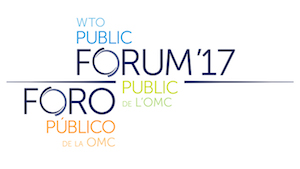Making trade more inclusive through digitally enabled services
27 Sep 2017 14:00h - 15:30h
Event report
[Read more session reports from WTO Public Forum 2017]
The aim of this session was to discuss how digitally enabled services can support growth, better jobs, raise wages and improve living standards. Ms Christine Bliss, President, Coalition of Services Industries, served as moderator. She reinforced the support of the Coalition of Services and Industries to the WTO and its work on liberalising services. The WTO has a central role in a scenario in which the norms of the General Agreement on Trade in Services (GATS) agreement need to be updated because of the speed of technology development.
According to Bliss, the negotiations on the Trade in Services Agreement (TiSA) could be a fruitful path towards the liberalisation of services, in particular, digitally enabled services. She assessed that trade and globalisation are under attack in many countries, but that the digital economy contributes with more than 3 trillion dollars to the global GDP.
H.E. Mr Álvaro Cedeño Molinari, Ambassador and Permanent Representative of Costa Rica to the WTO, opined that adapting norms to a context of fast paced evolution of technology is a major challenge. As technology moves to the cloud, for example, new questions with regards to geographical borders arise. Information should be free, but, at the same time, it should be regulated to prevent abuse.
According to Molinari, e-commerce is trade 2.0, and the WTO Working Programme on e-commerce needs to be refreshed to regain contact with reality. Costa Rica and Pakistan created the group ‘Friends of E-commerce for Development’, composed by 13 members. The group is trying to identify the most important policy questions and priorities. One of them is to have connectivity universally available.
Ms Sahra English, Vice President, Global Public Policy, Mastercard, started by explaining that Mastercard is not a credit card company, but a technology company. Promoting financial inclusion is a key goal for Mastercard. the free flow of data and services is a pre-condition to achieve this goal, and the company relies on the WTO to create the norms that will facilitate data flows. English mentioned some examples of projects to support financial inclusion. In South Africa, a digital ID and social benefit programme was created, combining biometric ID, fingerprints and other types of identification to the credit card. As a result, there was a USD$350 million reduction on fraud. The company also has projects in India, supporting the government’s plan for a ‘cashless India’. Mastercard helped to develop the first interoperable QR code to accept and receive payments, an important measure to include SMEs and small businesses in the financial system.
Mr Greg Stofko, Senior Counsel, Regulatory Affairs Group, FedEx Express, highlighted the importance of connectivity not only through digital infrastructure, but also through logistics. Platforms and social media bring actors together and this creates infinite possibilities for new businesses, including services. In the policy field, FedEx places great importance on the liberalisation of services and on trade facilitation. Worldwide, there is a need to digitise customs and promote paperless trade. The Trade Facilitation Agreement was a great step to reduce trade costs for SMEs, but more needs to be done.
Bliss asked the speakers to comment on barriers that are relevant to digitally enabled services. Molinari opined that infrastructure is an important one, and it requires investment. In addition to that, barriers to the free flow of data could emerge as the biggest obstacle for digitally enabled services in the years to come. English concurred that restrictions on data flows and data localisation provisions are a growing concern, especially in the developing world and Asia. She believes that data localisation reduces efficiency and increases cost for companies. It does not matter where data sits, it is access to the data that matters. Moreover, data localisation multiplies the points of vulnerability and data leaks. Stofko added that access to information about how to overcome barriers to trade is still an issue. Assistance and awareness building is important to small businesses.
Bliss commented that some of the hardest topics to tackle in current trade negotiations are data flows and data localisation, customs, and de minimis. Stofko opined that customs procedures need to be improved and de minimis need to be raised. Governments can save resources if they raise the de minimis and move away from the revenue-collection model.
Molinari pondered that trade in services will be an important topic at the next WTO Ministerial Conference. It is being affected by domestic regulation, qualification and licensing requirements, for example, that have the potential to constitute unjustified barriers to trade. According to him, what is expected from the 11th Ministerial Conference is guidance from ministries on how to deal with e-commerce in the WTO, a mandate to discuss the topic horizontally, across siloes, and better understand the role of the WTO.
by Marilia Maciel
Related topics
Related event

